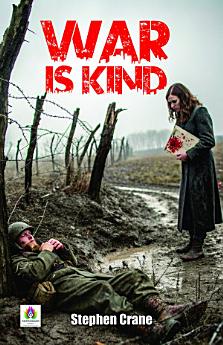War is Kind
About this ebook
Through gripping imagery and poignant language, Crane captures the profound pain and loss experienced by soldiers and their loved ones. His works serve as a stark reminder that war is not merely a clash of armies; it is a devastating event that erodes humanity, transforming lives irrevocably. The poems are infused with a sense of realism that resonates deeply with readers, making them confront the emotional weight of warfare and the enduring impact it has on those who survive.
Crane’s exploration of the themes of war intricately weaves together narratives of loss and grief, showcasing both the personal and collective toll of conflict. Through his vivid depiction of mortal struggles, he sheds light on the psychological burdens that accompany violence, making it impossible for readers to ignore the profound consequences that war inflicts. Each poem stands as a testament to the soldiers who suffer, reminding us of their sacrifices and the senselessness of their wounds.
With an innovative approach to structuring narratives, Crane’s work stands out as an early example of realism in literature, where frank acknowledgment of the horrors of battle transcends romantic embellishments. The juxtaposition between the notion of war as 'kind' and the grim realities he presents serves as a biting critique of societal norms and the glorification often associated with military conflicts. Instead of portraying soldiers as mere heroes, Crane paints them as vulnerable individuals overwhelmed by chaos, agony, and loss.
As a part of American literature, War is Kind serves not just as a historical reflection but as a timeless commentary on the nature of violence and its dehumanizing effects. Crane's masterful use of language creates an immersive reading experience, inviting readers to reflect on the absurdity of war and the importance of embracing peace. Through metaphors and symbols, he articulates the struggles of humanity when faced with conflict—prompting readers to recognize the fragile nature of existence.
This collection is essential for those seeking to understand the emotional impact of warfare within the broader context of American history and literature. Crane’s poignant reflections challenge us to consider our perceptions of war and grapple with the moral implications of conflict. The haunting and profound messages contained within these poems linger long after the last line is read, ensuring that the pain and lessons of the past continue to resonate within our contemporary discussions on violence, conflict, and humanity.
In conclusion, War is Kind is a deeply moving exploration that serves to humanize the often shadowy figures portrayed in wartime narratives, laying bare the emotional and ethical dilemmas faced by those impacted by the horrors of conflict. Stephen Crane's ability to articulate the unutterable pain of war makes this collection a cornerstone for readers interested in the profound effects of human suffering, the ironies of conflict, and the search for empathy in a fractured world.








